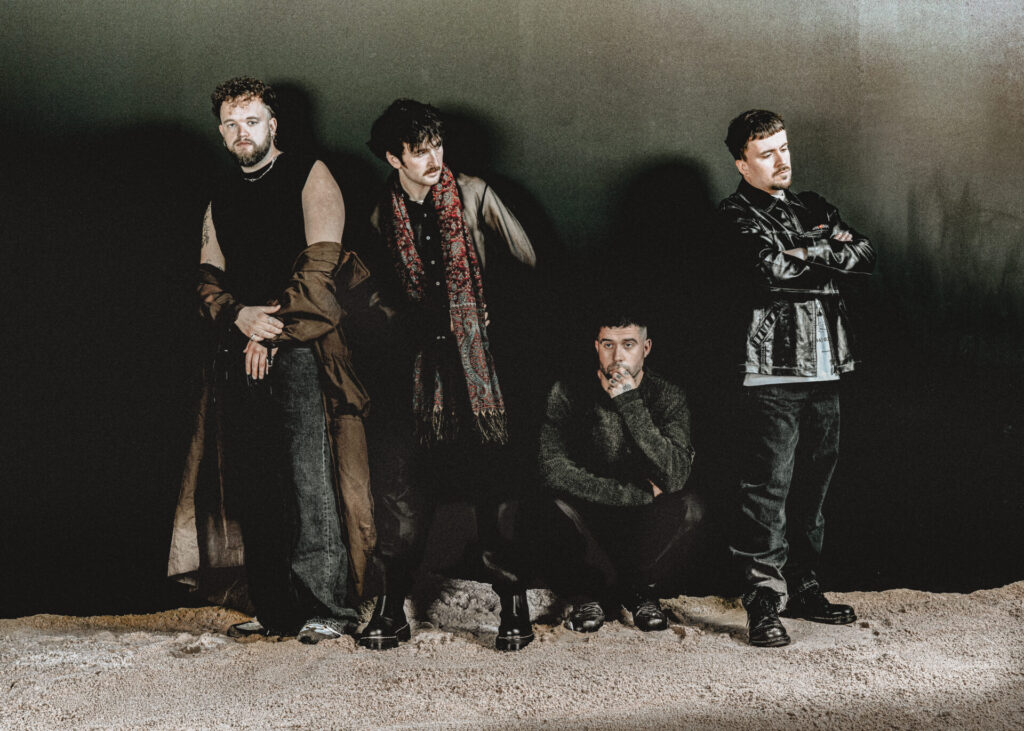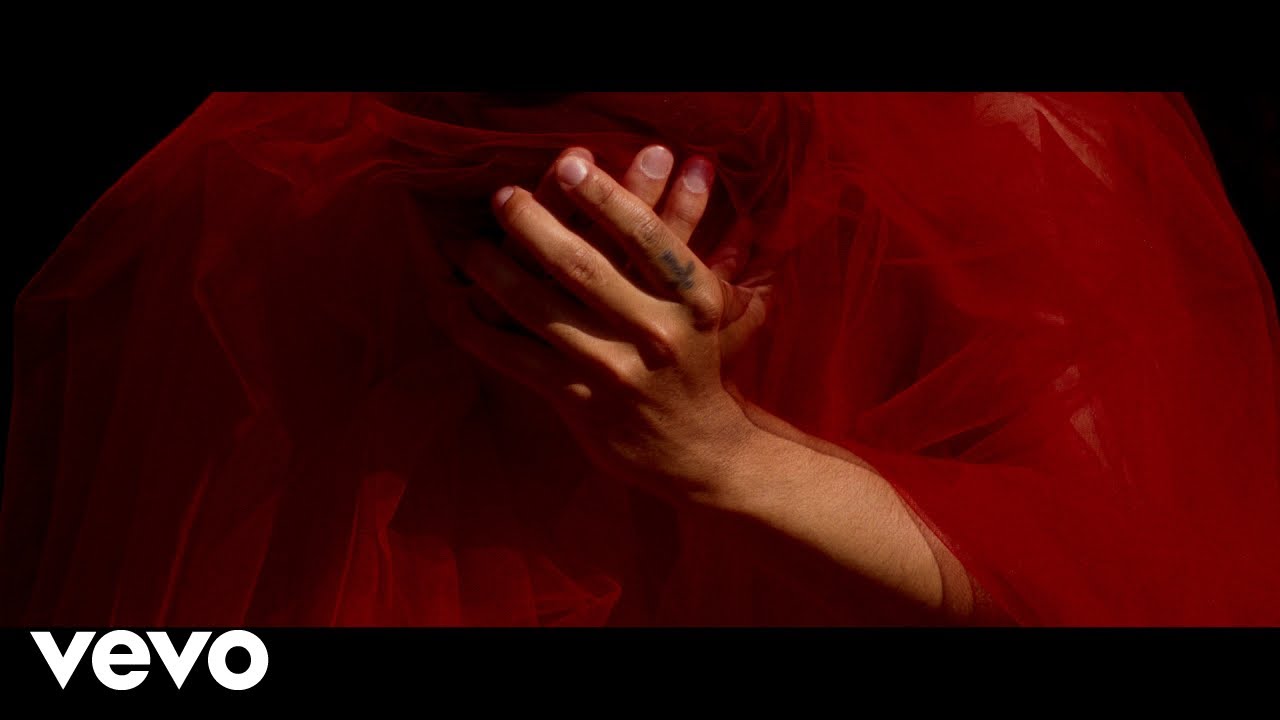Venture to Stockport, specifically St. Peter’s Square, and you’ll find Maruja – Joseph Carroll (saxophone), Harry Wilkinson (vocals/guitar), Matt Buonaccorsi (bass) and Jacob Hayes (drums). Playing football, riding bikes, a gang at odds with nearby Manchester, a city perennially obsessed with overtaking the rise of its own star. For them, life explodes in the shadows of the post-industrial outskirts as Spanish lavender stretches through the cracks of a concrete bridge.
While it’d be unfair to say that the entirety of Manchester’s culture is solely erected upon the foundations of Factory Records and Oasis, it can sometimes be hard to find a contemporary sense of belonging in a place where the rich heritage of the past is hard to ignore. “I feel like we’ve always been an anomaly in terms of the music we’ve been making, especially in Manchester,” says Carroll. “The first time we probably felt a bit of community was when we played a gig in Yes with Enola Gay. We felt a lot more at home with them, and they’re from Belfast.”
“We started a band when we were 16 years old. It started on one fateful trip on a 192 bus with me and the old guitarist [Liam Laurence]’’ says Wilkinson. “I’d been writing songs and playing music since I was eight years old, like a lot of us, and I had been writing some songs by myself. I showed them to [Liam], and he was like ‘this is cool, we should make a band out of this’. He said, ‘I know a bassist and a drummer who are in my form at college, so we can pull those guys in on it’ and that’s how I met Matt. From that, Maruja was born immediately. We were still kids, so the music wasn’t very mature, and it never really reflected who we were, but then Joe entered the band.”
Carroll had had saxophone lessons since he was young, and upon seeing a saxophonist taking a left-field approach to a brother’s school concert, the seeds of exploring and manipulating the sonic dimensions of the instrument were sown. “School bands are so regimented and focused on getting things ‘right’, so the juxtaposition of seeing someone playing with complete freedom, without control in such a controlled setting was really striking and something I felt I was lacking in my early years,” he recalls. “As soon as we started writing music together,” he continues, “that was when I really fell in love with it and wanted to pursue it.”
Meanwhile, upon relocating from Portsmouth, Hayes was attracted to the city as a way to escape the “isolating and trapped feeling you get from growing up in a distant village in the country,” he says. “I went to uni because I needed to get out of where I was living, and that was the only sort of feasible way that I could do so, and I didn’t, similarly to all of us, study music at school or an educational system.” It was here, along with a close comrade of the band, Jack Buxton, that Hayes was introduced to Maruja as an entity in need of a committed drummer. “I saw them a few times [and thought] ‘This is exactly why I wanted to go to Manchester. To see strange or experimental music.’ Jack and I were there for a soundcheck without a drummer, so I was like, ‘I could resolve that issue.’”
“It felt like it was a unified experience,” Hayes recalls of seeing Maruja play before he joined. And when considering the band’s ability to leap from sounding like Parliament into an approximation of Coltrane’s ‘Kulu Sé Mama’ covered by Caspar Brötzmann Massaker and late-period Deftones with a hypnotic Sufi infusion, we can understand why he thought so. The band’s debut album Pain To Power is an unabating machine, erupting with whirlwinds of sandblasting shrapnel-spitting sax and scaffold-swallowing bass blows, rhythmic spatters and semipermeable soundscapes, with Wilkinson’s voice soaring above the city and rap-snarling its edifices into rubble.
The concept of individual erasure to reach devastating levels of power is the result of Maruja surrendering themselves to the forces of unconscious improvisation. “It is all coming from improv,” states Hayes. “Recently we’ve started getting back into the rehearsal room, and going back to the roots. You can lose sight of the fact that the thing which grounds us and has got us to where we are is being in a room together and improvising and having that unleashing of emotion. Last year we did like 50 shows, and we did an hour and a half set improvising every single time. It’s a really important thing for us. It helps keep that live kinetic energy.”

That energy, that unified experience ravaging through the album, replicates their visceral live performances. It’s here where one can understand why Pain To Power feels the way it does. In their embryonic, improvisational stages Hayes says that tunes “reveal themselves in different ways”, often pulling, stretching, speeding up, and slowing down. In these moments, the roles of artist and audience overlap in fascinatingly spontaneous and sensory entanglements. Be it the immersion of the band in the pit of a live crowd. Be it the message of ‘see you in the trenches’ issued to those about to watch them perform before a gig. Be it the unanimously repeated mantra at the end of every gig Wilkinson initiates: “We wish you peace, prosperity and unity in these times of global oppression. Together we are stronger.”
If the medium is the message, Maruja’s message is clear. With the notion of community forever at the core, their aural bolt of sweat and flesh and scraps of clothing and calloused palms is a reactive force to be reckoned with. “Everything that’s gone on with Palestine Action,” says Wilkinson, “where a protest group has been turned into a terrorist organisation, shows the importance again of those safe spaces where people can release their emotions about the tragedy of what’s going on in the world, and protest. It is a place to protest and a place to show solidarity with each other and feel safe to be yourself around people that you maybe admire and that you connect emotionally with through their music.”
With a burning bullseye in sight, jazz, as Maruja grasp it, is less about genre, but more a yearning to breach certain emotional as well as sonic thresholds. As their music collapses into a concave of its own making, Maruja surpasses the physical realm as we know it, the result of a surge towards musical telepathy. “It’s those moments where we don’t need to be democratic about anything,” says Carroll. “The thing has been made. It’s more of a self-discovery than being taught in an academic way. There’s no sort of archaic depth to it. People like Miles Davis and Pharaoh Sanders are really big influences for us because you can really hear that, the way that they’re pushing the instrument and making these bizarre noises.”
With Maruja, the political and the personal are the same faces on one coin, scratching itself into a state of unprecedented oblivion. Invisible men, women and children are hung on a string by failing healthcare systems. Fake news is fed into our daily digital diet like an intoxicating catheter. Late-stage capitalism crushes people to death against its goliath columns. A crack in the cask of social media brings battlefields and scenes of unrivalled horror to our fingertips. Kakistocracy, a government by the worst men, is a commonplace means to run a country.
“The overall message of the album kind of just came naturally to us through Wilkinson’s lyrics because we all believed in the same things – the genocide in Palestine was happening at the same time as writing,” adds Buonaccorsi. “So the message became completely front and centre. We knew what we wanted to talk about. Nina Simone once said that it’s the artist’s duty to reflect the times. She meant not only musicians but sculptors, painters, dancers. That’s something that we wholeheartedly believe in.”
Maruja are a band that cannot help but extract the political nuance in all of life’s lacerating, existential machinations, because they simply cannot, as human beings, fail to experience those lacerations. In doing so, as ‘Saoirse’ (Irish for freedom), reminds us as a track inspired by the band’s Celtic roots and encompassed in a comic-strip found in Carroll’s grandfather’s possessions of a ‘Black and Tan’ soldier about to board a boat to Palestine: “It’s our differences that make us beautiful.”
There is no fear. We pray for love.
Maruja’s debut album Pain To Power is released on 12 September via Music For Nations



